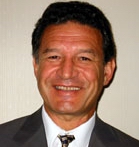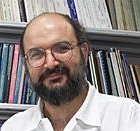|
|
WINE 2006 is proud to have the following distinguished scientists for the
three plenary talks of its scientific program:
| SPEAKER: |
Prof. Abraham
Neyman, Hebrew University of Jerusalem, Israel |
 |
| TITLE: |
Recent Developments in Learning and
Competition with Finite Automata |
| ABSTRACT: |
Consider a repeated two-person game. The
question is how much smarter should a player be to effectively predict
the moves of the other player. The answer depends on the formal
definition of effective prediction, the number of actions each player
has in the stage game, as well as on the measure of smartness. Effective
prediction means that, no matter what the stage-game payoff function,
the player can play (with high probability) a best reply in most stages.
Neyman and Spencer [4] provide a complete asymptotic solution when
smartness is measured by the size of the automata that implement the
strategies. |
| SPEAKER: |
Prof. Mihalis Yannakakis,
Columbia University, USA |
 |
| TITLE: |
Succinct Approximation of Trade-off
Curves |
|
ABSTRACT: |
When evaluating different
solutions from a design space, it is often the case that more than one
criteria come into play. The trade-off between the different criteria is
captured by the so-called Pareto curve. The Pareto curve has typically
an exponential number of points. However, it turns out that, under
general conditions, there is a polynomially succinct curve that
approximates the Pareto curve within any desired accuracy.
In the first part of the talk we address the question of when such an
approximate Pareto curve can be computed in polynomial time. We discuss
general conditions under which this is the case, and relate the
multiobjective approximation to the single objective case. In the second
part of the talk, we address the problem of computing efficiently a good
approximation of the trade-off curve using as few solutions (points) as
possible. If we are to select only a certain number of solutions, how
shall we pick them so that they represent as accurately as possible the
whole spectrum of possibilities? Can we find a solution that offers the
best compromise between the various objectives? |
| SPEAKER: |
Prof. Xiaotie Deng,
City University of Hong Kong, Hong Kong S.A.R. |
 |
| TITLE: |
Making Economic Theory Operational |
| ABSTRACT: |
We focus on the opportunity
the Internet has provided for a fully operational Economic Theory. We
should review a few of the current development of the algorithmic
approach in its study and postulate on the important issues that lie
ahead of us. |
Site maintenance: Spyros Kontogiannis. Last update:
04/12/2006. |